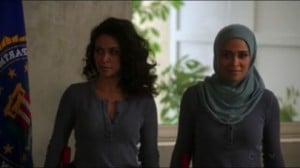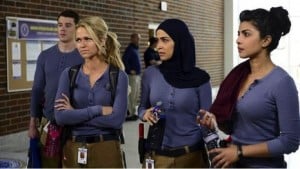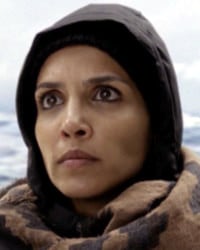Edina Lekovic, the Communications Director for the Muslim Public Affairs Council in Los Angeles, says the hardest part of her job is convincing the media to run non-crisis stories about Muslims. Yusra interviews her to figure out what drives the woman we see on TV.
Yusra: You work as the communications director of the Muslim Public Affairs Council in Los Angeles—and you’ve called yourself a translator between Muslims and mainstream journalists. What’s the hardest part of that job?
Edina Lekovic: The hardest part of my job is pitching non-crisis stories about Muslims to reporters and producers in mainstream media outlets. There’s very little room on the media radar for a story about Muslims that isn’t about us being a perpetrator, a victim, or condemner of evil actions. I spend a little time every day developing unique story ideas about the daily reality of Muslim American life and those Muslim American pioneers all over the country who are shaping their communities and their country—but get little attention in the process. It’s an uphill battle to get these kinds of stories told, and it’ll only happen if we keep pushing and if more Muslims enter the journalism field so they can take part in telling stories and deciding which stories get shared with broader audiences. We have to take ownership of changing our image to the world.
Yusra: Is the misrepresentation of Islam and Muslims in the press getting better?
EL: That’s a tough question. I think the news about Muslims and Islam has grown a lot in terms of numbers, but it’s still mostly bad news. By and large, Muslim spokespersons like myself mostly get called to respond to bad news. That’s when we get the most attention and when we’re deemed the most “relevant.” The bad news about that is that it associates even mainstream Muslims like me with “bad news Muslims,” because that the only time they see a Muslim speaking on the news.
My dream is to get a CNN special like “Black in America” or “Latino in America” get made about being “Muslim in America.” Most of the public doesn’t know what our normal, daily lives look like and what we value most. Instead, they know what the violent extremists look like and what they believe. So it’s no wonder that public perceptions about our faith and our community are still so negative.
At a recent event we held with the legendary African American actress, producer, choreographer and director Debbie Allen (Fresh Prince of Bel Air, That’s So Raven, Everybody Hates Chris), she said something that still sticks with me: “You can’t expect anyone to tell your story for you. You’ve gotta get in there and do it yourself. And you’ve gotta have talent, because talent speaks for itself too.” I’m really encouraged that so many young Muslims are now pursuing journalist and film as career options. Nothing replaces being in these industries as a way to get better, more accurate and compelling stories told.
Yusra: What did you want to be growing up as a child? Did that change once you entered college?
EL: Ever since I was probably five or six years old and started watching the evening news with my parents, I grew up wanting to be a journalist. I have always been captivated by the power of stories and storytellers to change hearts and minds and connect people across vast distances. I pursued journalism starting in high school (at my high school newspaper and also as an intern at a local public access TV station), which only strengthened my decision to pursue a career in journalism. So, when I started college at UCLA in 1995, I knew that I wanted to work at The Daily Bruin (the campus newspaper) as much as I could, since the school did not offer a degree in journalism. I studied American Literature & Culture formally, but I basically majored in The Daily Bruin because I spent all of my waking hours there researching, interviewing, writing, and editing.
I fell deeper and deeper in love with journalism throughout college, and was ecstatic when I was chosen to be Editor-in-Chief of The Bruin my junior year. I was the first Muslim woman in hijab selected for the position, so I felt a lot of responsibility to do well not only for myself but also for the reputation of Muslims on campus and off campus. It was the thrill of the chase on a good story that hooked me and held me all those years.
Yusra: What female spiritual or religious leader do you look up to?
EL: Asma Barlas, an amazing and gifted Muslim American scholar. Her book, Believing Women in Islam: Unreading Patriarchal Interpretations of the Quran is one of the best written in English to separate the words of the Qur’an from the incomplete/skewed interpretations provided by some classical (and even modern) scholars’ tafsir (interpretation of Quran). She is a dear hero to me.
Yusra: You have to be pretty confident to hold your job: responding to tough questions from the media, responding to vile attacks carried out in the name of Islam, and being secure enough in your faith and identity to be able to do that. What advice do you have for Muslim women who likewise seek prominent career paths?
EL: (Laughs) If I’m confident, it’s because I’ve had more than five years of daily practice facing tough questions about Islam and Muslim from all sides, facing questioning looks from a lot of other Muslims who aren’t used to seeing a young woman in a leadership role, and being forced to step up and do my job to the best of my abilities every single day. My confidence is a by-product of surviving countless unexpected and challenging experiences, and getting rewarded by having to face even more diverse and challenging experiences.
At some point, confidence is critical to your survival and your success. You have to be comfortable in your skin and the only way you get there is by doing your best every day, forgiving yourself when you don’t, and always remembering that you are a servant for a bigger cause. I make du’a everyday before I step into my office, “Ya Allah, help me to be useful today.”
Yusra: So Muslim women shouldn’t be reluctant to be more outspoken, and active within their community, despite what some Muslims may say?
EL: As a Muslim woman, I don’t think you can get anywhere if you’re always asking for permission to be who you are, or if you’re waiting for acceptance. If you are a woman and want to do community work, you have to show grace, kindness and a strong backbone whenever you’re in community settings. People may not be used to seeing a woman leading in these settings, but they’ll welcome it when they see how hard you’re willing to work and how much love you bring to the task. Hard work speaks for itself. It also earns you respect, and creates opportunities for you to do more work. A friend once told me, “The harder you work, the more work you get.” Initially I thought that this was a warning, but soon enough, I realized that it’s the path to success.
Yusra: You founded Elev8, an arts-based youth program. Tell me about that—how can Muslims get involved?
EL: I helped create Elev8 at the end of 1999, along with a group of my closest friends. We have held multiple programs over the years aimed as exposing Muslim youth to the arts (painting, photography, music, acting, etc.) as a tool for better understanding themselves, sharing their stories, and considering some creative new outlets. We’ve held spoken word and music events featuring Muslim and non-Muslim performers. We held a six-month long program called “Project LA,” where we took a dozen junior high and high school kids to diverse communities around LA and exposed them to those community’s artists so they could learn about diverse cultures they live among and experience how art can be used as a tool of empowerment and storytelling. Some of our alumni (who are now in college) have moved on to make music, conduct workshops for other youth on the arts, and perform in front of diverse audiences.
Yusra: You’ve said that your relationship with your hijab evolves and that you’ve worn it in different ways, as an expression of where you are at that point. How does this apply to your relationship with God and Islam?
EL: Yes, my relationship to hijab has certainly evolved over the years, as has my understanding of Islam. I decided to wear hijab because I wanted to represent a different kind of Muslim woman than the ones I saw on television and in films all the time. I wanted to be a good example of a professional, intelligent, confident and successful Muslim woman—and that’s what I set out to do when I first put on hijab. I was naïve, but I carried the best of intentions. That decision and the meaning of hijab in my life—like my decision to be a practicing Muslim—has gone through a lot of evolution in the 13 years that have passed. But I have no regrets, because that’s how it is with any faith journey one undertakes.
When I first started practicing Islam as a college student, I had a much more literal (black-and-white) understanding of Islam that divided everything into good or bad, permissible or forbidden, Muslim or non-Muslim. I think that’s true of anyone who has adopted a new belief system or even a new habit. You operate in black and white until you develop some comfort. I even wore galabayyas (long robe/gown worn by some Muslim women) for part of my senior year. I thought this would help me get closer to God. After awhile, I realized it only got me closer to being an Arab.
Yusra: How do you “keep the faith” with an intense job and real world pressures? Any advice for Muslims at low or high points regarding their connection to Islam?
EL: Around my 29th birthday, I started to realize that I was the only one who had to live with my decisions. And that I had to choose to serve God, not fear what other people who think of me or how they might judge me. That realization and that choice have given me an inner peace and a renewed sense of closeness to God, regardless of how I wear my hijab or handle myself in front of more traditional community members. My advice for Muslims facing low points in their connection to God is to keep going. I always tell myself “you gotta push through.” If you keep at it, if you’re kind to yourself, and if you keep looking for opportunities to learn and grow, you will find your way. Just like ups and downs are part of life, they are also part of your Islamic life. Accept that and you will find more strength to keep going in faith.
To find out more about MPAC or Elev8 email Edina [email protected].











